[Big read] Doubts over Fukushima wastewater release hard to overcome
It has been 12 years since the Great East Japan Earthquake and the resulting tsunami that damaged a nuclear power plant at Fukushima. As plans progress to release treated wastewater from the nuclear power plant into the sea, Lianhe Zaobao journalists Tan Jet Min and Foo Choo Wei explore the challenges in the decision, as well as the difficulties facing related industries, such as fishing.
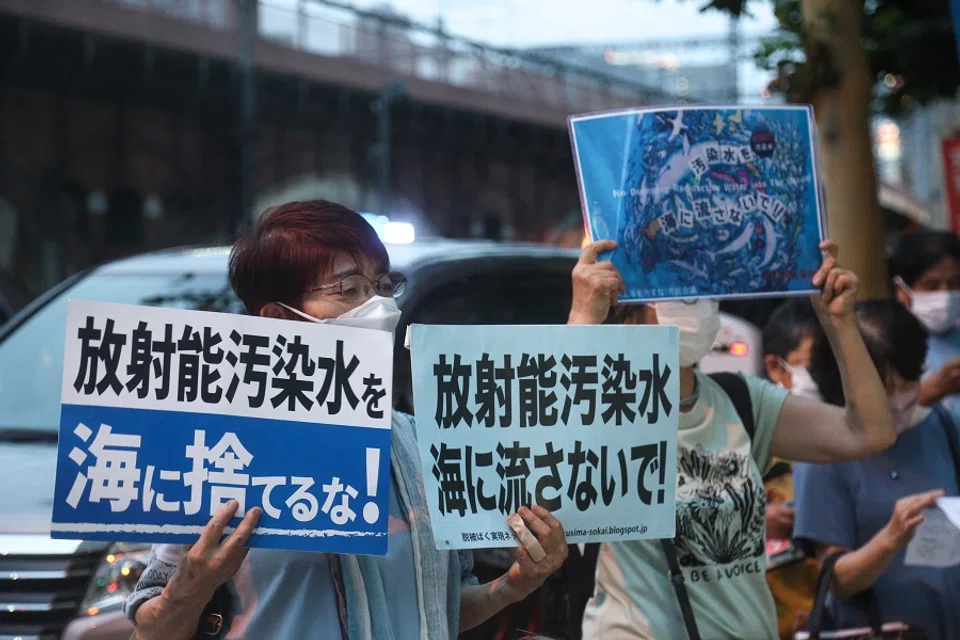
Fukushima's fishing industry, which was long in the doldrums due to the nuclear accident in the Japanese prefecture, has gradually improved in recent years. However, the government's plan to release treated wastewater into the ocean around summer has once again left local fishermen unsettled.
Plans to release water under way
It has been 12 years since the Great East Japan Earthquake on 11 March 2011 and its resulting tsunami that devastated a nuclear power plant in Fukushima. Following the incident, Tokyo Electric Power Company (TEPCO) has continuously injected water into the containment vessels of Units 1 to 3 at the Fukushima Daiichi nuclear power plant to cool the reactor cores, after which the contaminated water is purified using the Advanced Liquid Processing System (ALPS).
As of early July, approximately 1.33 million tonnes of treated wastewater, including the inflow of groundwater and rainwater, are stored in over a thousand tanks in the plant, which is close to capacity. Frequent seismic activity in the area presents risk of leaks from long-term storage, and so the Japanese government and TEPCO plan to begin releasing the treated wastewater into the sea after completing an underwater discharge tunnel at the end of June this year.
... the UN's nuclear watchdog, the International Atomic Energy Agency (IAEA), approved Japan's plans for the release of the treated wastewater, saying that it would have negligible environmental impact.
TEPCO started testing the discharge equipment on 12 June, to ensure that the treated wastewater can be released one kilometre offshore. The Nuclear Regulation Authority of Japan conducted a three-day final inspection of the facilities on 28 June.
TEPCO said that the permit for discharging the treated wastewater may be issued one week after the inspection is completed, and Japanese media is speculating that the project could begin as early as August, and may take 30 to 40 years.
On 4 July, the UN's nuclear watchdog, the International Atomic Energy Agency (IAEA), approved Japan's plans for the release of the treated wastewater, saying that it would have negligible environmental impact.
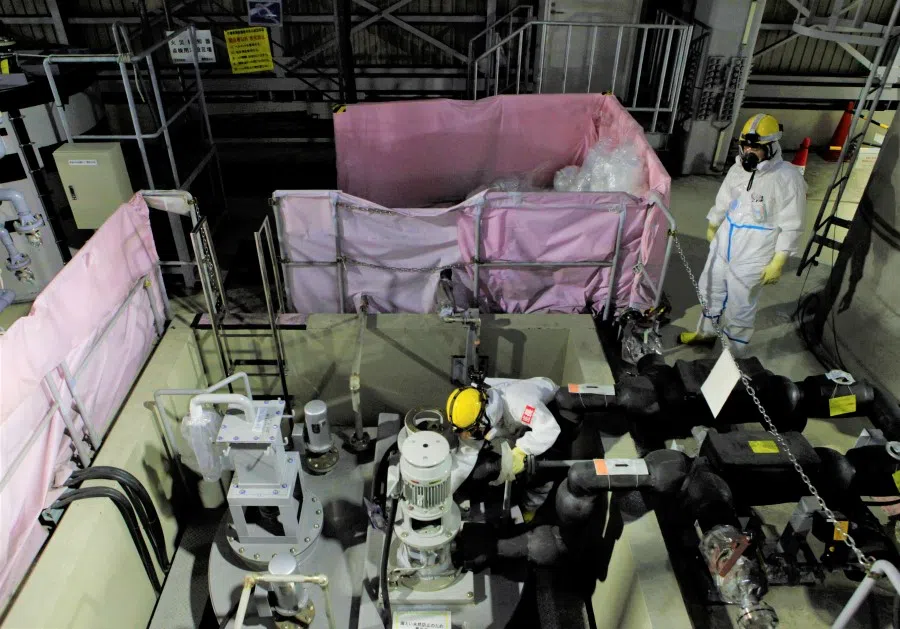
Since the Japanese government announced the wastewater discharge plan in 2021, protests from within and outside the country have been relentless. However, after attending a memorial event for the earthquake in Fukushima in March this year, Japanese Prime Minister Fumio Kishida affirmed that for the reconstruction of Fukushima, "the disposal of ALPS treated water is an issue that we can never postpone".
During a March session of the House of Councillors, he also firmly said that the timing for releasing the treated water into the ocean between spring and summer would remain unchanged.
On 5 July, Japanese media reported that the Japanese government could start the wastewater discharge operation in August at the earliest.
"The Government of Japan will never discharge 'nuclear-contaminated water' nor nuclear wastewater (核废水) that exceeds regulatory standards into the sea..." - Embassy of Japan in Singapore
Improving Japanese public opinion
In December 2022, the Japanese government began advertising and laying the groundwork for the safety of the treated wastewater through newspapers and television to garner public support. Terms associated with Fukushima such as "radiation water", "nuclear-contaminated water" and "nuclear wastewater" were dropped and replaced with terms such as "ALPS treated water" and "purified treated water".
TEPCO also created a dedicated page in Japanese, Korean, Chinese and English on its official website, reiterating that the radiation levels in the treated wastewater have minimal impact on human bodies and the environment, equivalent to one-thousandth of the radiation dose from a single dental X-ray.
In response to inquiries from Lianhe Zaobao, the Embassy of Japan in Singapore emphasised, "The Government of Japan will never discharge 'nuclear-contaminated water' nor nuclear wastewater (核废水) that exceeds regulatory standards into the sea," and urged the media to stop using such "factually incorrect expressions".
It added, "Please be fully aware that using the term 'nuclear-contaminated water' and 'nuclear wastewater (核废水)' which is used in your media reporting promotes a false understanding and harmful rumours that water released exceed regulatory standards and adversely affects humans and the environment."
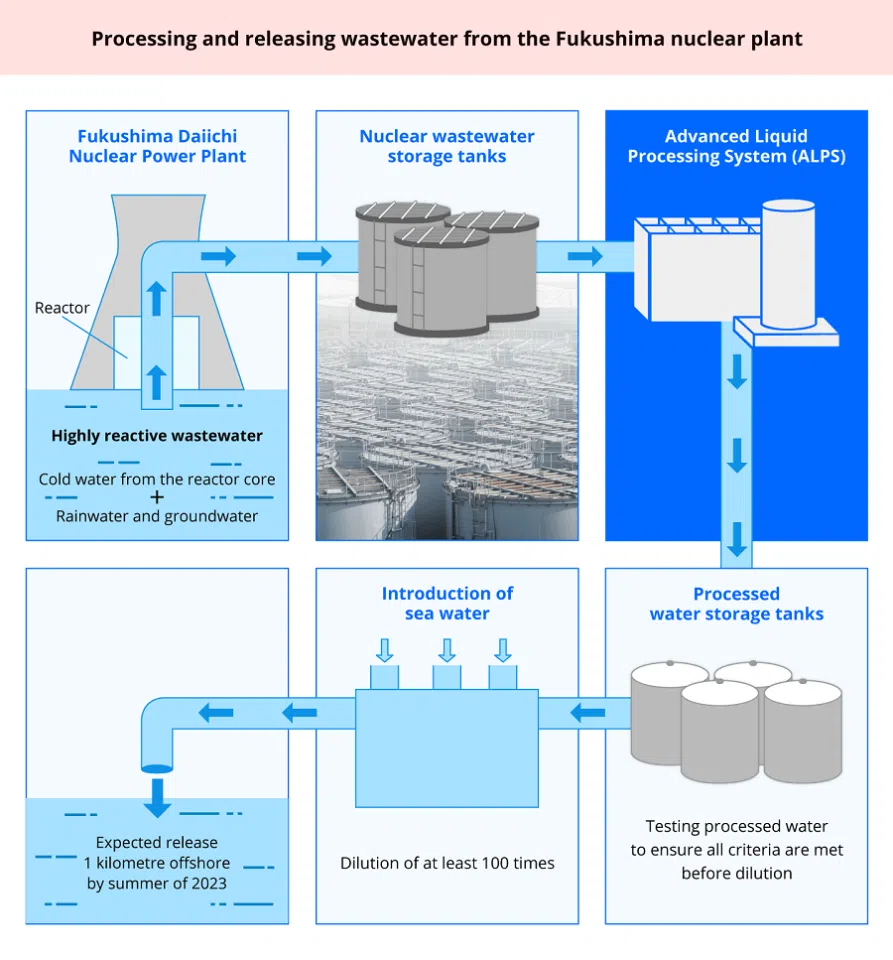
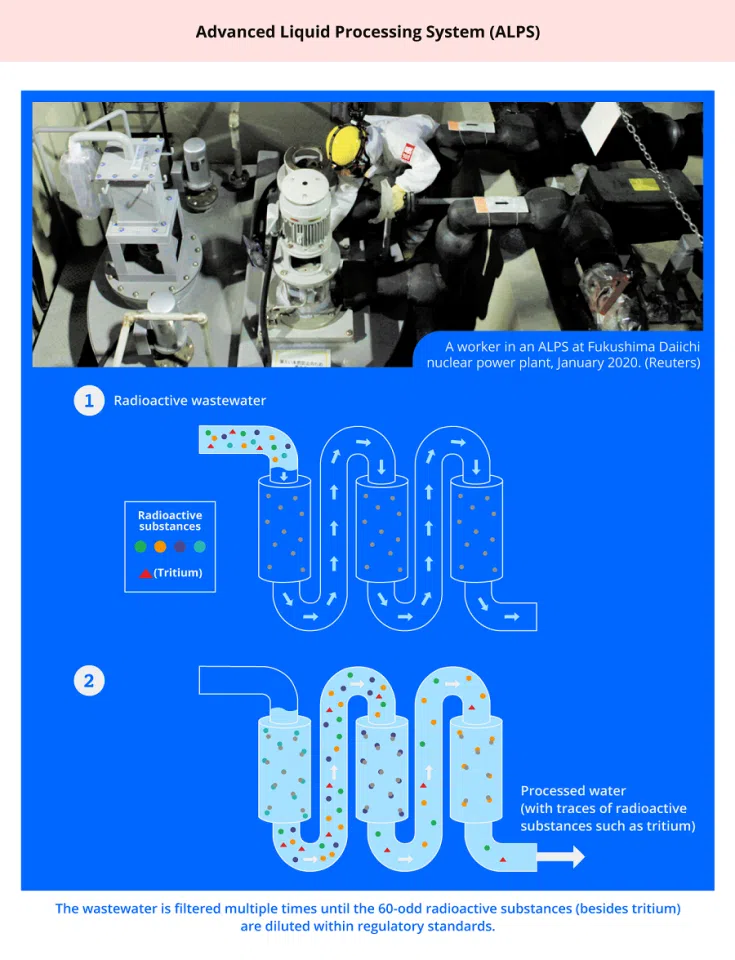
With the authorities' efforts, a survey conducted by the Ministry of Economy, Trade, and Industry in February 2023 showed that support among Fukushima residents for the release of treated water from the nuclear power plant had increased from 46% in September 2022 to 51%; in other regions of Japan, support also rose from 44% to 46%.
In a public opinion poll conducted by the Asahi Shimbun in March this year, for the first time, more people recognised the benefits of releasing the treated water from Fukushima into the sea, with 51% in favour and 41% against. In previous surveys conducted over the past two years, supporters and opponents were roughly equal.
... black rockfish caught in the harbour at the Fukushima nuclear power plant in May had caesium levels that were 180 times higher than Japan's food safety standards.
Impact on reputation of fishing industry
However, given that seafood caught in the surrounding waters occasionally exceeds the permissible limits of radioactive substances, it is difficult for people to feel completely at ease. Most recently, on 5 June TEPCO released a report indicating that black rockfish caught in the harbour at the Fukushima nuclear power plant in May had caesium levels that were 180 times higher than Japan's food safety standards.
Physicist Tao Yoichi, who had conducted soil radiation tests in Iitate village in Fukushima following the nuclear accident, told Zaobao that the impact of nuclear radiation is long term. After the accident, Fukushima residents were plunged into a whirlpool of confusion, contradictions and anxiety, and were deeply unsettled about the radiation that they couldn't see.
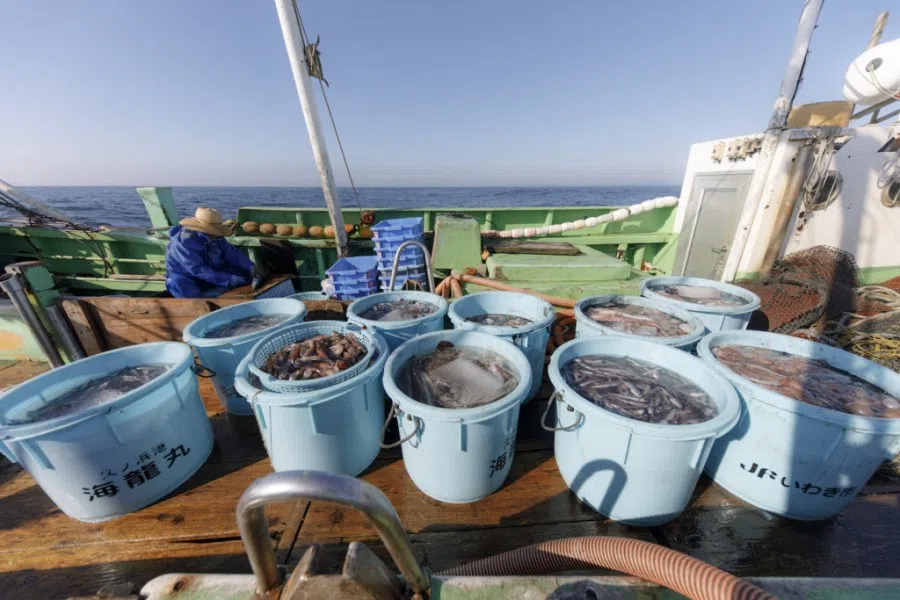
Fukushima used to be an important area for the development of natural organic crops in Japan, and seafood was also abundant. However, local children were told to wear face masks and avoid contact with the soil after the nuclear accident, which left people confused about whether they should consume vegetables grown in Fukushima.
Tao said that in order to protect their children from radiation, some families have their elderly and children consume vegetables from different sources. One grandmother told him, "I won't live for many more years anyway, so it doesn't matter if I eat them."
"It is disappointing that the authorities have made such a decision when fishing activities have only just returned to normal... " - Fukushima resident and fisherman
The Japan Fisheries Association is also concerned that once the treated wastewater is released into the ocean, it will severely damage the reputation of the Japanese fishing industry. A 69-year-old fisherman in Soma city told Zaobao that TEPCO had assured fishermen in 2015 that they would not release the treated water into the sea without the understanding and consent of the fishermen.
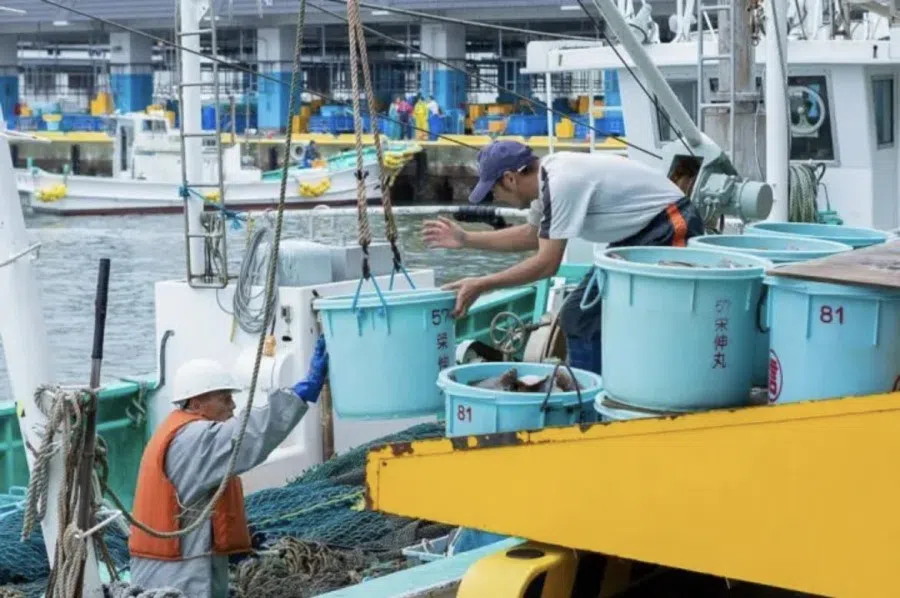
The fisherman, who declined to be named, said, "It is disappointing that the authorities have made such a decision when fishing activities have only just returned to normal... Even if the data [released by the government] show that it is safe, the theory that the treated water is harmful will still damage the reputation of the fishing industry."
Singapore diners continue to avoid Fukushima items
While scientific data show that most crops and seafood from Fukushima are safe, consumers in Singapore still struggle to overcome their concerns and worries when dining.
Japanese company PARCO collaborated with six Japanese restaurants in Singapore to launch a two-month Fukushima ingredient promotion at the 100 AM shopping centre in Tanjong Pagar in June. In addition to distributing goodie bags containing ingredients from Fukushima on the first day of the event and giving away rice for answering a survey, the participating restaurants also offered dishes prepared with seafood and vegetables from Fukushima.
One of the event organisers told Zaobao that those who received the goodie bags praised that the vegetables looked fresh and delicious. However, staff members from participating restaurants privately revealed that only three or four tables of customers ordered Fukushima dishes each day, and they were all Japanese customers. Although the restaurant servers tried to recommend Fukushima dishes to local customers, their suggestions were politely declined.
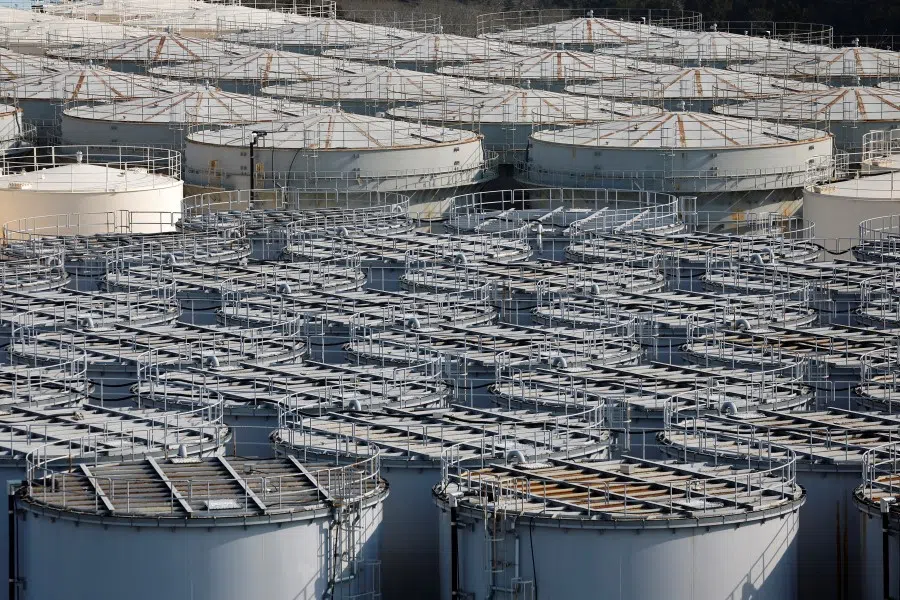
However, the manager of one participating restaurant - who declined to be named as she was not authorised to speak to the media - urged consumers not to worry too much. She said, "We should have confidence in the review process by the Singapore government... The food that enters Singapore is quality assured." She said that she sometimes makes juice with the fruit and vegetables from Fukushima, and they tasted fresh.
Strict controls in Fukushima
In response to queries from Zaobao, the National University of Singapore's Nuclear Research and Safety Initiative (SNRSI) said that there was a significant reduction in the number of fish from Fukushima that did not meet safety standards in radiation levels, and the export of Fukushima seafood is subject to strict controls. "The risk of health problems in Singapore due to consuming contaminated food is almost zero," it added.
However, those interviewed would still avoid Fukushima products. Counsellor Ong Yi Ying, a fan of Japanese food in her 40s, believes that existing technology may not be able to fully monitor the harm of treated wastewater on marine life and the environment, and she will still avoid buying seafood produced in Fukushima for safety reasons.
Twenty-five-year-old Lim Pei Ying, a student who recently returned from a trip to Japan, also said that unless she is left with no other choice, she would still choose ingredients produced in other parts of Japan over Fukushima.
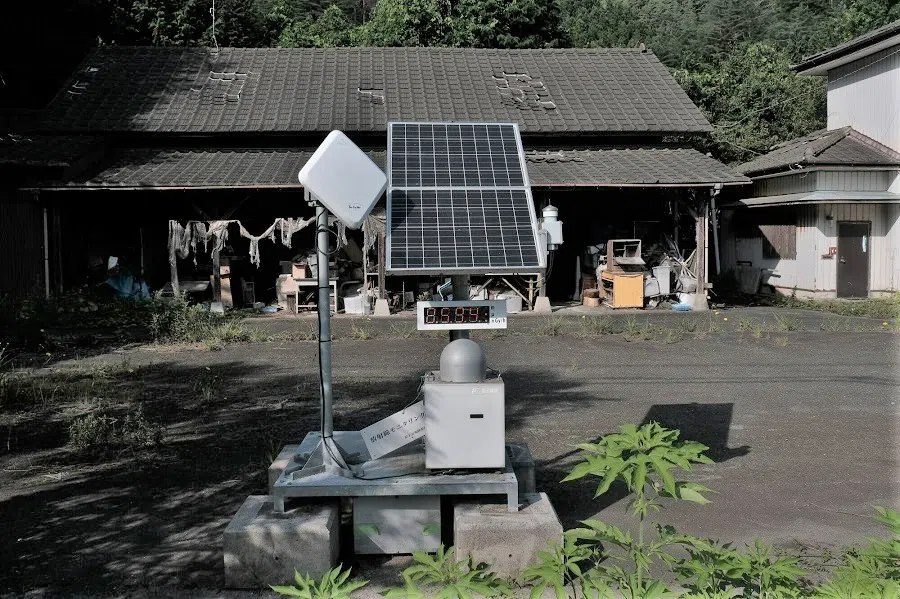
Although scientists have already reassured the public that food from Fukushima is safe to consume, 74-year-old retiree Young Ruo Quan is still concerned. He told Zaobao, "Since the nuclear accident, problems with nuclear power plants have been exposed one after another, and I find it hard to believe the data. I think there must be some commercial interest behind it."
He is also worried about his trip to Sapporo with his family later in September. He explained, "Sapporo is pretty near Fukushima. I'm worried that we may accidentally eat food from there, so I will try to verify the place of origin as much as possible."
Effectiveness of water treatment in question
The outside world is also questioning the reliability and stability of the purification system developed by the Japanese company. Additionally, there is much debate about how much tritium, which cannot be effectively filtered by the system, affects humans and the environment.
The Fukushima nuclear power plant currently uses the filtration system ALPS, which was developed by Toshiba Corp in October 2012, to filter the water that has come into contact with the core of the melted reactor. The system was launched five months after it was first developed, and the company claims that the system can remove 62 radionuclides, excluding tritium, from the contaminated water.
"Demonstrating the effectiveness of ALPS is one of TEPCO's most important tasks, but they failed to show that the system can successfully operate on a large scale... Until today, there is limited evidence of their success." - Shaun Burnie, senior nuclear specialist with Greenpeace East Asia
Shaun Burnie, senior nuclear specialist with Greenpeace East Asia, questioned the effectiveness of Japan's ALPS. He told Zaobao that Purolite, a global leader in resin-based separation, is the original developer of ALPS, but TEPCO stopped working with Purolite and instead worked with Toshiba, although the latter had no relevant experience. Moreover, TEPCO concealed the system's failure to purify wastewater to meet safety standards for the first five years after it was put into operation.
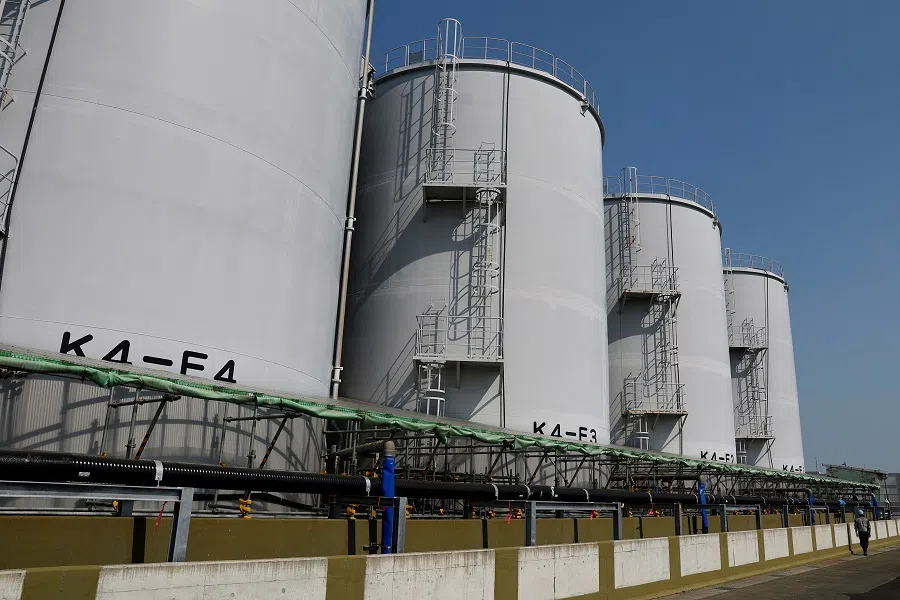
Although Japan later improved the system, Burnie accused TEPCO of not releasing key data such as the frequency of ion exchange resin filter cartridge replacement and the initial concentration of nuclides in the water, and only taking a 30-litre sample for testing before the storage tank was full to project the total amount of nuclides in the water.
He said, "Demonstrating the effectiveness of ALPS is one of TEPCO's most important tasks, but they failed to show that the system can successfully operate on a large scale... Until today, there is limited evidence of their success."
In response to Zaobao's queries, TEPCO explained that in order to ensure sample representativeness, researchers only extracted samples after making sure that the water in the storage tank had been circulated and stirred for more than 144 hours. Furthermore, TEPCO will disclose the nuclide composition of the untreated water before releasing the treated wastewater into the sea. The IAEA and other third-party expert agencies appointed by the Japanese government and TEPCO will also verify the data.
At the same time, the Japanese government repeatedly stressed that the treated wastewater will be filtered more than once before it is released into the sea, so that the tritium, which is difficult to separate from water, will be diluted to one-40th of the concentration permitted under Japanese safety standards, or one-seventh of the World Health Organization's guideline for drinking water.
After the treated water is released into the sea, the tritium concentration will be further diluted by large amounts of sea water, ultimately posing "very low risks to the environment, fish and people". - Kai Vetter, Professor of Nuclear Engineering, University of California, Berkeley
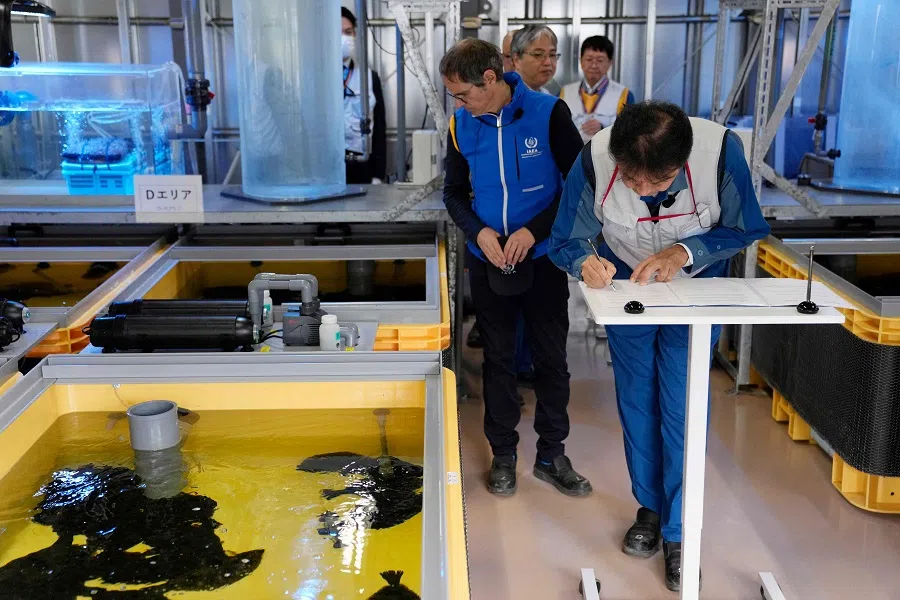
TEPCO also raised flounders, abalone and seaweed in the nuclear power plant's treated water to prove that tritium has no significant effect on aquatic products. According to their research, the tritium concentration in these flounders, abalones and seaweeds is also said to decrease over time.
Kai Vetter, a professor of nuclear engineering at the University of California, Berkeley, with 30 years of experience in nuclear measurements, agreed with TEPCO's conclusion and urged people to engage in rational discussions. He told Zaobao that some radioactive materials are naturally found in the environment, human bodies and fish. After the treated water is released into the sea, the tritium concentration will be further diluted by large amounts of sea water, ultimately posing "very low risks to the environment, fish and people".
The SNRSI concurred, stating, "Theoretically, tritium can be harmful if consumed or inhaled in large amounts. But the biological half-life of tritium is only 40 days", which means that it takes 40 days for the concentration of tritium to decrease to half of its original amount. And so it is "not long enough to cause health problems".
However, Lin Wuhui, the vice-dean of Guangxi University's School of Marine Sciences, told Zaobao that tritium is a man-made radionuclide that emits beta radiation as it decays; exposure to ionising radiation is harmful to organisms and the environment.
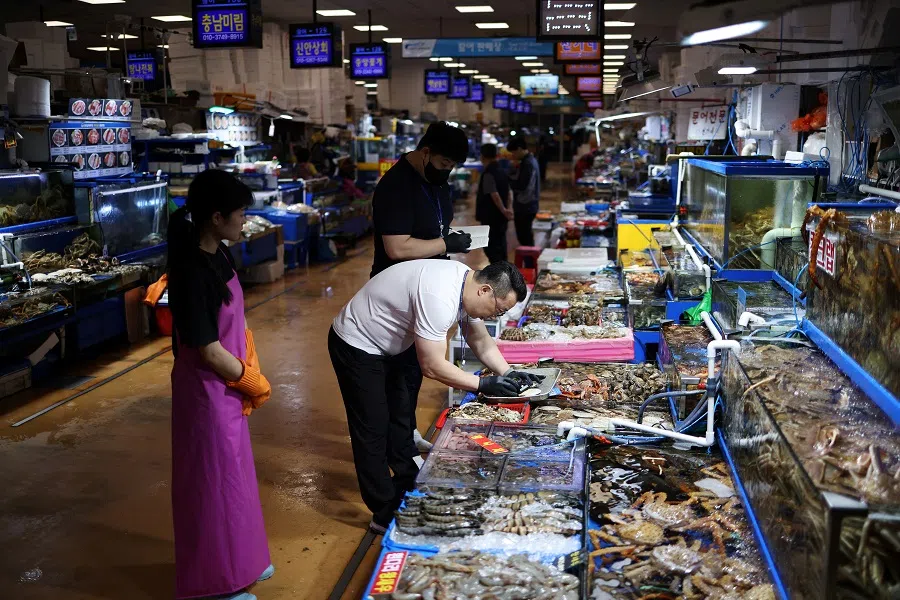
According to Lin, recent research found that when organic tritium enters the body, it stays for a longer period of time and is more harmful. But this is an emerging research area and research is still lacking.
Lin thinks that it is necessary for the outside world to consider whether the dilution of the radionuclide concentration in the treated wastewater before its release is due to ALPS filtration or the effect of a large quantity of sea water. "How do we tell? How do we monitor the situation? ALPS can reduce the emission of radionuclides, but sea water dilutions can only change the concentration and not the total emissions," he said.
In February 2014, it was discovered that there was a new leak of 100 tonnes of highly radioactive water because TEPCO had forgotten to turn off a valve.
Japan's credibility on the line
Shortly after the nuclear accident, a series of nuclear waste leak scandals rocked Japan, dealing a big blow to its credibility. Already deemed "bankrupt" in terms of its "nuclear credit", Japan now faces even greater challenges to win the understanding and support of its neighbours in releasing Fukushima wastewater into the sea.
Professor Jamie Quinton, head of the School of Natural Sciences at New Zealand's Massey University, previously told Xinhua that as early as April and May 2011, Japan had already dumped untreated wastewater into the ocean to free up water tanks. This arbitrary dumping had sowed the seeds of distrust.
TEPCO's early supervision of Fukushima was also heavily criticised. While researchers found that the Fukushima wastewater may have already leaked based on their sea water tests, TEPCO only admitted it in July 2013, and later discovered that the welded parts of the storage tanks had corroded. The next month, TEPCO found that up to 300 tonnes of highly contaminated water was seeping into the sea every day. In February 2014, it was discovered that there was a new leak of 100 tonnes of highly radioactive water because TEPCO had forgotten to turn off a valve.
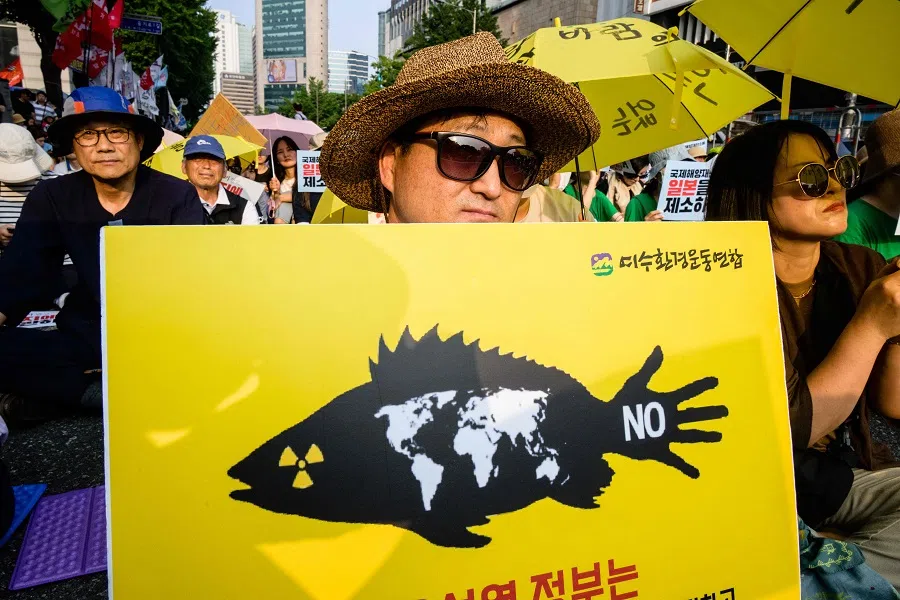
Some countries expressed strong dissatisfaction towards the release of treated wastewater into the sea. Fiji's Deputy Prime Minister Manoa Kamikamica recently questioned at a meeting, "If the Advanced Liquid Processing System (ALPS) treated water stored at the Fukushima Daiichi nuclear plant is safe, then why is it not used in Japan for alternative purposes like manufacturing and agriculture?"
Chinese state media also harshly criticised Japan's Fukushima wastewater discharge plans, slamming Japan for "unilaterally" deciding to dump Fukushima wastewater into the ocean; being driven by "selfish interests"; and making an unpopular decision. It even asserted that Japan was "bankrupt" in terms of its "nuclear credit". Two years ago, a Chinese foreign ministry spokesperson had called on Japanese officials to drink the treated wastewater to prove its safety. The Chinese fired its latest salvo by announcing that it would impose a ban on imports from ten Japanese prefectures, including Fukushima.
Fukushima's plan to release treated wastewater into the ocean has also surprisingly become a bone of contention between the ruling and opposition parties in South Korea. There had been occasional protests in South Korea over Japan's Fukushima wastewater plan, and the South Korean government had also summoned Japan's ambassador to Seoul to protest the plan. But after the recent thawing of South Korea-Japan relations, the South Korean government sent a team of experts to Japan, who indicated that the sea water was "safe" based on the data. But opposition parties slammed the government, accusing them of "deceiving" the people.
On 7 July, the South Korean government again said that Japan's plan to discharge treated wastewater has met global safety standards and that South Korea respects the UN nuclear watchdog's approval for the release.
This article was first published in Lianhe Zaobao as "福岛核厂处理水排海 争议疑虑难化解".
Related: Japanese academic: A hard look at the true impact of Fukushima Daiichi water release | Fukushima wastewater: Why China is protesting while the US gives the nod | Guangdong nuclear power plant incident: Making a mountain out of a molehill? | Taiwanese wavering over referendum on Fourth Nuclear Power Plant






